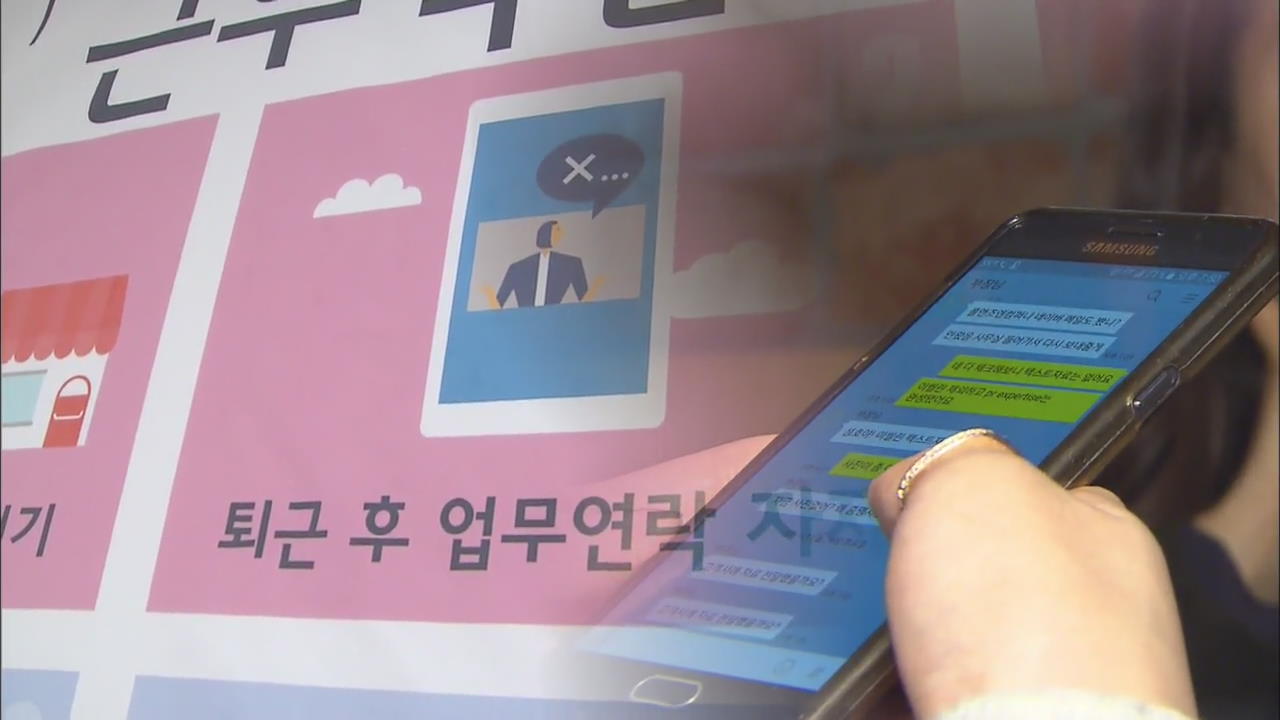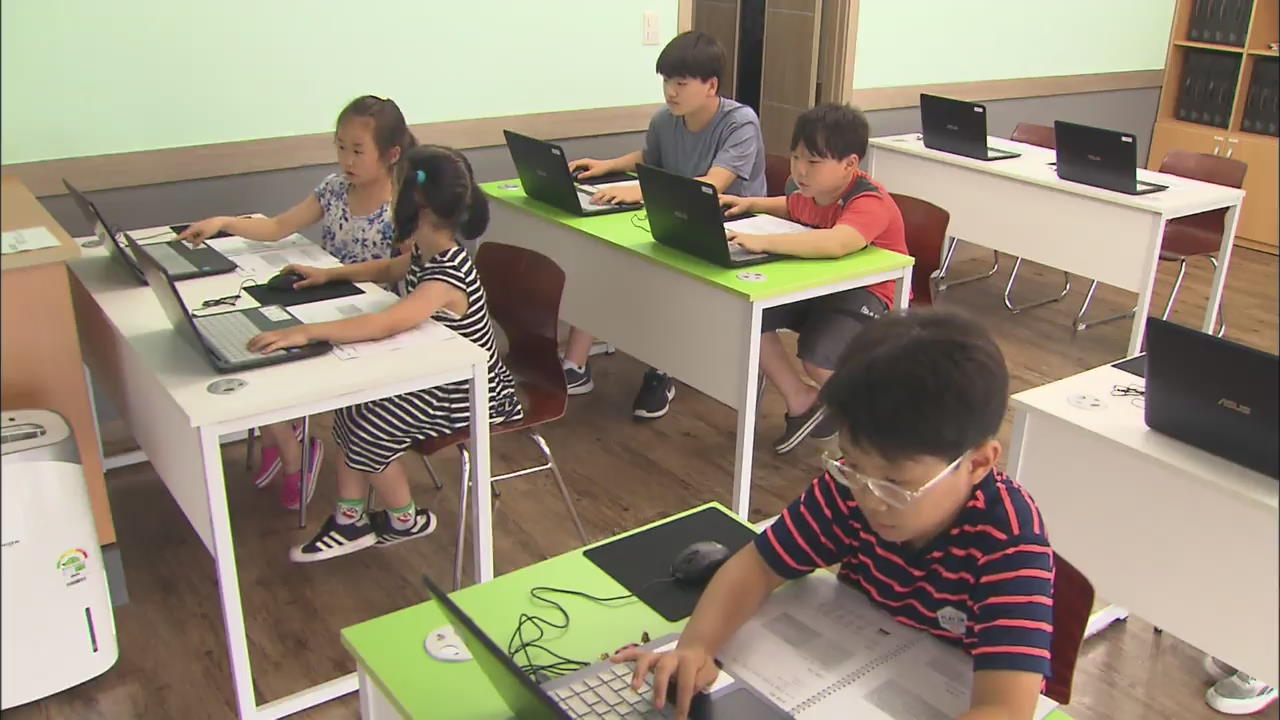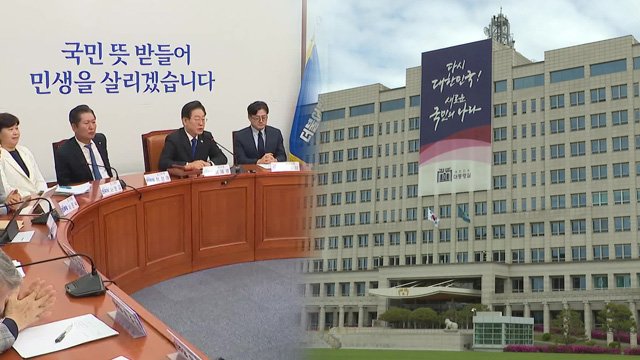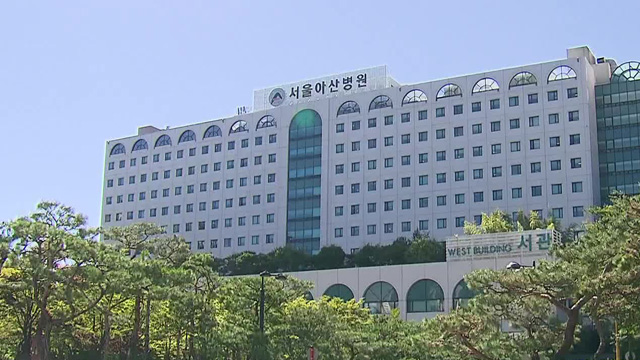Setting Boundaries
입력 2017.08.04 (14:06)
수정 2017.08.04 (14:21)
읽어주기 기능은 크롬기반의
브라우저에서만 사용하실 수 있습니다.
[Anchor Lead]
With the widespread use of smartphones many office workers report receiving work-related messages even after work hours, which can cause enormous stress. Efforts are underway in Korea to ban around-the-clock work messages.
[Pkg]
A group of office workers have lunch together, but this man's phone keeps ringing. From requests to submit documents to questions about how report preparations are going, office workers cannot find time to relax. Even after leaving the office, it's not over yet. Messages with work instructions continue to pour in.
[Soundbite] (Office Worker (Voice modified)) : "They tell us to leave the office on time, but once I get home, my phone keeps ringing. I don't feel like my workday is over."
The results of a poll show that seven out of ten working people are severely stressed because of work-related calls and messages that they receive after work. With the boundaries between work and personal life becoming increasingly blurred these days, the government has launched efforts to improve the situation. The government is considering devising guidelines on the use of mobile messengers in workplaces and encouraging businesses to follow them through labor supervisors.
[Soundbite] Oh Eun-kyung (Ministry of Employment & Labor) : "Work instructions given via communication methods such as smart devices must be avoided outside of work hours to protect workers' health and privacy."
A bill to ban businesses from using mobile messengers outside of work hours is pending at the National Assembly, but there are no legal grounds for cracking down on workplaces or punishing them. Therefore the situation can only be improved through businesses' voluntary participation.
With the widespread use of smartphones many office workers report receiving work-related messages even after work hours, which can cause enormous stress. Efforts are underway in Korea to ban around-the-clock work messages.
[Pkg]
A group of office workers have lunch together, but this man's phone keeps ringing. From requests to submit documents to questions about how report preparations are going, office workers cannot find time to relax. Even after leaving the office, it's not over yet. Messages with work instructions continue to pour in.
[Soundbite] (Office Worker (Voice modified)) : "They tell us to leave the office on time, but once I get home, my phone keeps ringing. I don't feel like my workday is over."
The results of a poll show that seven out of ten working people are severely stressed because of work-related calls and messages that they receive after work. With the boundaries between work and personal life becoming increasingly blurred these days, the government has launched efforts to improve the situation. The government is considering devising guidelines on the use of mobile messengers in workplaces and encouraging businesses to follow them through labor supervisors.
[Soundbite] Oh Eun-kyung (Ministry of Employment & Labor) : "Work instructions given via communication methods such as smart devices must be avoided outside of work hours to protect workers' health and privacy."
A bill to ban businesses from using mobile messengers outside of work hours is pending at the National Assembly, but there are no legal grounds for cracking down on workplaces or punishing them. Therefore the situation can only be improved through businesses' voluntary participation.
■ 제보하기
▷ 카카오톡 : 'KBS제보' 검색, 채널 추가
▷ 전화 : 02-781-1234, 4444
▷ 이메일 : kbs1234@kbs.co.kr
▷ 유튜브, 네이버, 카카오에서도 KBS뉴스를 구독해주세요!
- Setting Boundaries
-
- 입력 2017-08-04 13:59:47
- 수정2017-08-04 14:21:34

[Anchor Lead]
With the widespread use of smartphones many office workers report receiving work-related messages even after work hours, which can cause enormous stress. Efforts are underway in Korea to ban around-the-clock work messages.
[Pkg]
A group of office workers have lunch together, but this man's phone keeps ringing. From requests to submit documents to questions about how report preparations are going, office workers cannot find time to relax. Even after leaving the office, it's not over yet. Messages with work instructions continue to pour in.
[Soundbite] (Office Worker (Voice modified)) : "They tell us to leave the office on time, but once I get home, my phone keeps ringing. I don't feel like my workday is over."
The results of a poll show that seven out of ten working people are severely stressed because of work-related calls and messages that they receive after work. With the boundaries between work and personal life becoming increasingly blurred these days, the government has launched efforts to improve the situation. The government is considering devising guidelines on the use of mobile messengers in workplaces and encouraging businesses to follow them through labor supervisors.
[Soundbite] Oh Eun-kyung (Ministry of Employment & Labor) : "Work instructions given via communication methods such as smart devices must be avoided outside of work hours to protect workers' health and privacy."
A bill to ban businesses from using mobile messengers outside of work hours is pending at the National Assembly, but there are no legal grounds for cracking down on workplaces or punishing them. Therefore the situation can only be improved through businesses' voluntary participation.
With the widespread use of smartphones many office workers report receiving work-related messages even after work hours, which can cause enormous stress. Efforts are underway in Korea to ban around-the-clock work messages.
[Pkg]
A group of office workers have lunch together, but this man's phone keeps ringing. From requests to submit documents to questions about how report preparations are going, office workers cannot find time to relax. Even after leaving the office, it's not over yet. Messages with work instructions continue to pour in.
[Soundbite] (Office Worker (Voice modified)) : "They tell us to leave the office on time, but once I get home, my phone keeps ringing. I don't feel like my workday is over."
The results of a poll show that seven out of ten working people are severely stressed because of work-related calls and messages that they receive after work. With the boundaries between work and personal life becoming increasingly blurred these days, the government has launched efforts to improve the situation. The government is considering devising guidelines on the use of mobile messengers in workplaces and encouraging businesses to follow them through labor supervisors.
[Soundbite] Oh Eun-kyung (Ministry of Employment & Labor) : "Work instructions given via communication methods such as smart devices must be avoided outside of work hours to protect workers' health and privacy."
A bill to ban businesses from using mobile messengers outside of work hours is pending at the National Assembly, but there are no legal grounds for cracking down on workplaces or punishing them. Therefore the situation can only be improved through businesses' voluntary participation.
이 기사가 좋으셨다면
-
좋아요
0
-
응원해요
0
-
후속 원해요
0

















이 기사에 대한 의견을 남겨주세요.